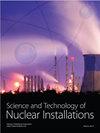Research on Radionuclide Diffusion Mechanism in the Ocean and Emergency Response under Oceanic Radioactive Events
IF 1
4区 工程技术
Q3 NUCLEAR SCIENCE & TECHNOLOGY
引用次数: 0
Abstract
On March 11, 2011, a serious radionuclide leakage accident occurred at Fukushima Daiichi nuclear power plant, and a large number of radionuclides were released, causing serious pollution to the ocean environment. On August 25, 2021, Japan announced the overall plan for the discharge of radioactive sewage from the Fukushima Daiichi nuclear power plant into the ocean, and the discharge will begin around the spring of 2023. All operational and under-construction nuclear power plants in China are distributed in coastal areas presently. In case of a nuclear leakage accident, radionuclides will diffuse through the ocean and pollute the ecological environment. The study of radionuclide diffusion mechanism in the ocean and emergency response plays an important role in accident mitigation under oceanic radioactive events. A radionuclide diffusion model in the ocean was established and the radionuclide diffusion mechanism in the ocean was analyzed. And then a prediction and monitoring system of radionuclide diffusion in the ocean was proposed. The results show that the short-term radionuclide diffusion is mainly influenced by the source term, flow field and decay of 131I, and the degree of influence decreases in turn. On the whole, influences of the flow field and 131I decay are weakened during the long-term diffusion. At the same time, the influence of 137Cs decay begins to be obvious and the influence of suspended matter is increasing. The influence of ocean organisms is always small. Problems of scientific prediction and protection were analyzed, and the emergency response scheme was given. It is of great significance to improve the capacity of emergency response for oceanic radioactive events.海洋放射性核素扩散机制及海洋放射性事件应急响应研究
2011年3月11日,福岛第一核电站发生严重放射性核素泄漏事故,大量放射性核素泄漏,对海洋环境造成严重污染。2021年8月25日,日本公布了福岛第一核电站放射性污水向海洋排放的总体计划,排放将于2023年春季左右开始。目前,中国所有正在运行和在建的核电站都分布在沿海地区。一旦发生核泄漏事故,放射性核素将通过海洋扩散,污染生态环境。海洋放射性核素扩散机制及应急响应研究在海洋放射性事件下的事故缓解中具有重要意义。建立了放射性核素在海洋中的扩散模型,分析了放射性核素在海洋中的扩散机理。在此基础上,提出了海洋放射性核素扩散预测与监测系统。结果表明:放射性核素的短期扩散主要受131I源项、流场和衰变的影响,影响程度依次递减;总体上,流场和131I衰减的影响在长期扩散过程中减弱。同时,137Cs衰变的影响开始明显,悬浮物的影响逐渐增大。海洋生物的影响总是很小。分析了科学预报和防护存在的问题,提出了应急预案。提高海洋放射性事件应急响应能力具有重要意义。
本文章由计算机程序翻译,如有差异,请以英文原文为准。
求助全文
约1分钟内获得全文
求助全文
来源期刊

Science and Technology of Nuclear Installations
NUCLEAR SCIENCE & TECHNOLOGY-
CiteScore
2.30
自引率
9.10%
发文量
51
审稿时长
4-8 weeks
期刊介绍:
Science and Technology of Nuclear Installations is an international scientific journal that aims to make available knowledge on issues related to the nuclear industry and to promote development in the area of nuclear sciences and technologies. The endeavor associated with the establishment and the growth of the journal is expected to lend support to the renaissance of nuclear technology in the world and especially in those countries where nuclear programs have not yet been developed.
 求助内容:
求助内容: 应助结果提醒方式:
应助结果提醒方式:


